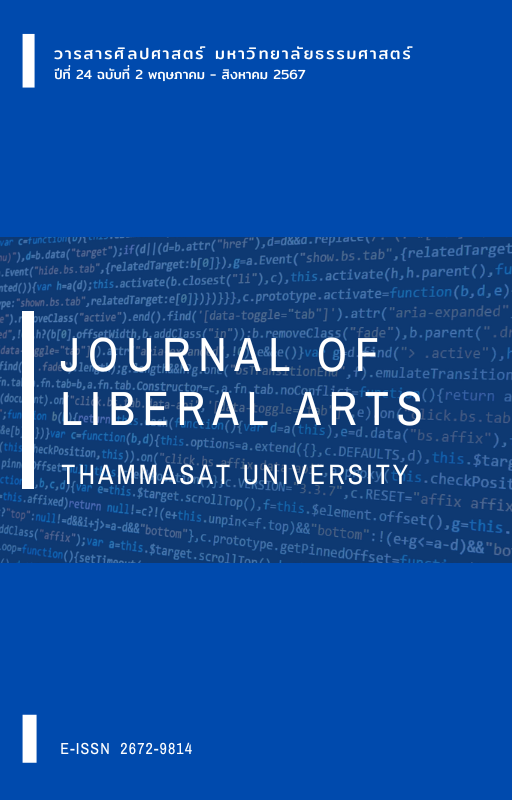Buddhist Methods of Listening to Enhance Wisdom
Main Article Content
Abstract
Communication is an essential part of life, both in everyday life and at work. Good communication skills help us work smoothly with others and understand the world more deeply. Effective communication leads to success in all areas of life. Listening is the most important communication skill. It is a skill that helps increase knowledge. As the proverb goes, Sususum lapte paññam. Listening is a skill that enhances knowledge, cultivates wisdom, and fosters good relationships. Wisdom is like a guiding light that helps humans live correctly and happily. It is something that everyone desires. Therefore, listening to gain wisdom is a skill that should be highly developed. In Buddhism, listening is considered a powerful tool that helps cultivate true wisdom. Listening to our inner voice helps us to understand ourselves. Listening to others helps us to understand them. The key principles that promote and develop listening skills are the Kalyanamitta principle, the Kalama Sutta principle, and Yoniso Manasikara. This article aims to provide readers with an understanding of the benefits of Buddhist listening methods and help readers apply Buddhist listening development principles, such as mindfulness practice, meditation, critical thinking, inner voice and outer listening, to improve listening skills effectively. This will lead to increased knowledge, improved relationships, and a more righteous and happy life.
Downloads
Article Details

This work is licensed under a Creative Commons Attribution-NonCommercial-NoDerivatives 4.0 International License.
References
เควิด โบห์ม. (2558). Dialogue: วิธีการสนทนาแบบมนุษย์สัมผัสและการเปลี่ยนวิธีคิดด้วยการฟังอย่างลึกซึ้ง (โสพส ศิริไสย์, เรียบเรียง). สำนักงานทรานส์ทีม. (ต้นฉบับพิมพ์ปี 2005).
ธิดา โมสิกรัตน์ และ ศรีสุดา จริยากุล. (2526). เอกสารการสอนชุดวิชาภาษาไทย 1 หน่วยที่ 6-11. มหาวิทยาลัยสุโขทัยธรรมาธิราช.
นัฐวุฒิ ศิริวรวัส. (2564). การศึกษาวิเคราะห์การฟังอย่างลึกซึ้งในพระพุทธศาสนาเถรวาท. [วิทยานิพนธ์ปริญญามหาบัณฑิต]. มหาวิทยาลัยมหาจุฬาลงกรณราชวิทยาลัย.
พรทิพย์ เกศตระกูล. (2565). พุทธจิตวิทยาการเสริมสร้างพลังใจเพื่อการเห็นคุณค่าแท้ในชีวิตของวัยรุ่น. [วิทยานิพนธ์ปริญญาดุษฎีบัณฑิต]. มหาวิทยาลัยมหาจุฬาลงกรณราชวิทยาลัย.
พระธรรมกิตติวงศ์ (ทองดี สุรเตโช). (2549). พจนานุกรมเพื่อการศึกษาพุทธศาสน์. เลี่ยงเชียง.
พระธรรมปิฎก (ป.อ. ปยุตฺโต). (2542). ธรรมนูญชีวิต (ฉบับชาวบ้าน) (พิมพ์ครั้งที่ 1). สหธรรมิก.
พระธรรมปิฎก (ป.อ. ปยุตฺโต). (2543). พุทธธรรม ฉบับปรับปรุงและขยายความ (พิมพ์ครั้งที่ 9). โรงพิมพ์มหาจุฬาลงกรณราชวิทยาลัย.
พระธรรมปิฎก (ป.อ. ปยุตฺโต). (2546ก). พุทธธรรม ฉบับปรับปรุงและขยายความ (พิมพ์ครั้งที่ 39). โรงพิมพ์มหาจุฬาลงกรณราชวิทยาลัย.
พระธรรมปิฎก (ป.อ. ปยุตฺโต). (2546ข). พจนานุกรมพุทธศาสตร์ ฉบับประมวลธรรม. มหาวิทยาลัย มหาจุฬาลงกรณราชวิทยาลัย.
พระธรรมปิฎก (ป.อ. ปยุตฺโต). (2564). พจนานุกรมพุทธศาสตร์ ฉบับประมวลศัพท์ (พิมพ์ครั้งที่ 35). สหธรรมิก.
พระธรรมปิฎก (ป.อ.ปยุตโต). (2547). วิธีคิดตามหลักพุทธธรรม (พิมพ์ครั้งที่ 10). ธรรมสาร.
พระธรรมมงคลญาณ (พระอาจารย์วิริยังค์ สิรินธโร). (2556). หลักสูตรครูสมาธิ เล่ม 3 (พิมพ์ครั้งที่ 11). พิฆณี.
พระพรหมคุณาภรณ์ (ป.อ. ปยุตฺโต). (2550). วิธีคิดตามหลักพระพุทธศาสนา. ธรรมสภา.
พระพรหมคุณาภรณ์ (ป.อ. ปยุตฺโต). (2563). พุทธธรรม (ฉบับปรับขยาย) (พิมพ์ครั้งที่ 54). ผลิธัมม์.
พระพรหมคุณาภรณ์ (ป.อ.ปยุตโต). (2552). สยามสามไตร สู่อนาคตที่สดใส ด้วยการศึกษาไทยวิถีพุทธ (พิมพ์ครั้งที่ 3). พิมพ์สวย.
มหาวิทยาลัยมหาจุฬาลงกรณราชวิทยาลัย. (2539). พระไตรปิฎกภาษาไทย ฉบับมหาจุฬาลงกรณราชวิทยาลัย. โรงพิมพ์มหาจุฬาลงกรณราชวิทยาลัย.
ยุพา ส่งศิริ. (2525). สุ.จิ.ปู.ลิ.ภาษาไทย. โรงพิมพ์ตำรวจ.
วิชชุดา ฐิติโชติรัตนา. (2562). คู่มือแนวปฎิบัติการปรึกษาแนวพุทธจิตวิทยาบูรณาการของพระสงฆ์ที่มีบทบาทให้การปรึกษา (พิมพ์ครั้งที่ 2). เชน ปริ้นติ้ง.
วิศิษฐ์ วังวิญญู. (2548). มณฑลแห่งพลัง ญาณทัศนะแห่งการเข้าถึงตัวตนที่แท้. สวนเงินมีมา.
สมชาย วรุณศิริ. (2562). การสื่อสารเชิงพุทธ. สำนักพิมพ์แห่งจุฬาลงกรณ์มหาวิทยาลัย.
สมเด็จพระพุทธโฆษาจารย์ (ป. อ. ปยุตฺโต). (2560). พัฒนาปัญญา เล่าเรื่องให้โยมฟัง ชุดที่ 2 (พิมพ์ครั้งที่ 1). ม.ป.พ.
สมเด็จพระพุทธโฆษาจารย์ (ป.อ.ปยุตฺโต). (2564). พจนานุกรมพุทธศาสน์ ฉบับประมวลศัพท์ (พิมพ์ครั้งที่ 35). สหธรรมิก จำกัด.
สีฟ้า ณ นคร, ขันทอง วัฒนะประดิษฐ์ และ บรรจบ บรรณรุจิ. (2562). กระบวนการการสื่อสารเพื่อเสริมสร้างองค์กรสันติสุขโดยพุทธสันติวิธี. วารสารสันติศึกษาปริทรรศน์ 7(2), 1-3.
อภิชญา ฤๅชัย. (2559). การฟังเชิงพุทธ: สันติวิธีเริ่มต้นที่ตัวเราเอง [สารนิพนธ์ปริญญามหาบัณฑิต]. มหาวิทยาลัยมหาจุฬาลงกรณราชวิทยาลัย.
อรจิรา วงษาพาน. (2558). พุทธวิธีในการสร้างเสริมภูมิคุ้มกันเพื่อการเผชิญวิกฤต. [วิทยานิพนธ์ปริญญาดุษฎีบัณฑิต]. มหาวิทยาลัยมหาจุฬาลงกรณราชวิทยาลัย.
Albom M. (2003). The five people you meet in heaven. Hyperion.
Breuning, J., Smith, S., & Harvey, M. (2018). The relationship between listening skills and emotional intelligence: a meta-analysis. Journal of Business and Psychology, 33(3), 511-523.
Gordon T. (1970). Parent effectiveness training: the proven program for raising responsible children. Bee Media Group.
Guo, Z., Chen, Y., & Wu, W. (2019). The effect of a listening skills training program on emotional intelligence and resilience. Journal of Happiness Studies, 20(2), 435-452.
Keller, J. W. (1979). The effective manager. Harper & Row.
Mackey, W. F. (1985). Effective listening: How to hear and understand. McGraw-Hill Education.
Rogers, C. (1980). Empathic: An unappreciated way of being. Houghton Mifflin Co.
Urbinner. (2566). Inner Self Listening ฟังเสียงโลกภายใน. https://www.urbinner.com/inner-self-listening
Williams, J. A. (2017). YouthThrive™: Promoting Youth Resilience: Trainer’s Guide. The Center for the Study of Social Policy.


